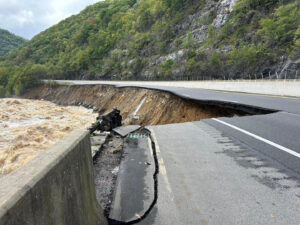 We can’t say we were totally surprised. As Hurricane Helene barreled down on Florida’s Gulf coast last week, forecasters warned it would almost certainly then turn north and affect inland areas of the Southeast. That wasn’t necessarily bad news. Many of us were bone-dry after a late summer draught. Rain would be a good thing.
We can’t say we were totally surprised. As Hurricane Helene barreled down on Florida’s Gulf coast last week, forecasters warned it would almost certainly then turn north and affect inland areas of the Southeast. That wasn’t necessarily bad news. Many of us were bone-dry after a late summer draught. Rain would be a good thing.
Little could we have imagined the devastation that lay in store.
In what has been described as a “mini-apocalypse,” parts of Georgia, South Carolina and Virginia were blasted by the storm. But the brunt of the damage happened in the mountains of Tennessee and North Carolina, which made it especially personal and frightening for me. I have many friends in east Tennessee and my son James and his family live in Asheville. As I write this, most roads in western North Carolina remain impassible. Sections of I-40 near the Tennessee-North Carolina line have literally washed away. My favorite slow-and-scenic route to Asheville, exiting the interstate at Newport and travelling along the French Broad River to Hot Springs and then to Marshall, has become the stuff of nightmares.
When I first learned that most of the area was without electricity, water or internet in a text from James on September 27, his mood was somewhat light. “The worst part is that I can’t play video games,” he wrote. “So I guess I’ll read.” He joked that he planned to start with “The Art of the Deal” and then move on to “Hillbilly Elegy.” Hahaha. But as the hours passed and it became clear that the situation was truly dire, the levity stopped.
Folks in the storm zone would have to make do with whatever food and beverages they had on hand because stores were closed. Amazon couldn’t deliver. Most, I assume, ate first from the refrigerator and freezer if they had a way to cook what needed cooking. Then it was on to whatever was in the pantry. The waiting and worrying began in earnest as word of the devastation spread. James and his family were some of the lucky ones. They had a roof over their heads, strong bodies that could walk most any distance required and a rain barrel filled with water with which to flush the toilet.
As I watched all this play out from Cookeville, where blessed rains were softly falling and things were as “normal” as they ever are, I made plans. Disaster resolutions, you might call them.
The first is to keep enough drinking water on hand to get through an emergency. Also plenty of non-perishable food. Peanut butter, specifically, which has a ridiculously long shelf life and is both calorie-dense and high in protein. I’ll also keep crackers to spread the peanut butter onto, though I’m certainly not above eating it with a spoon. I’ll have gas in the car tank so I can charge my cell phone. Candles. Flashlights with spare batteries. Propane in the grill. And sturdy buckets in which to collect “flush water” from nearby City Lake.
My next resolution is to work tirelessly to elect candidates who acknowledge that climate change is real. We’re living in its fallout. And I’ll fight tooth-and-nail against the “anti-socialist” nonsense that wants to eliminate agencies like NOAA and FEMA and DOT and the National Guard. Good grief. In times like these, how could we possibly get along without them?
Last but not least, I resolve to urge everyone affected by this (or any) tragedy to write about it. Fill up a page. Then fill up a notebook. It’s especially important that children—and I’m thinking here of my eleven-year-old and ten-year-old Asheville granddaughters—record what’s happening and how they feel about it during these strange, scary times. Because when they’re old, they’ll be exceedingly glad to have those memories on paper so they can dig them out and read them.
And share them with their own kids and grandkids.
(October 5, 2024)